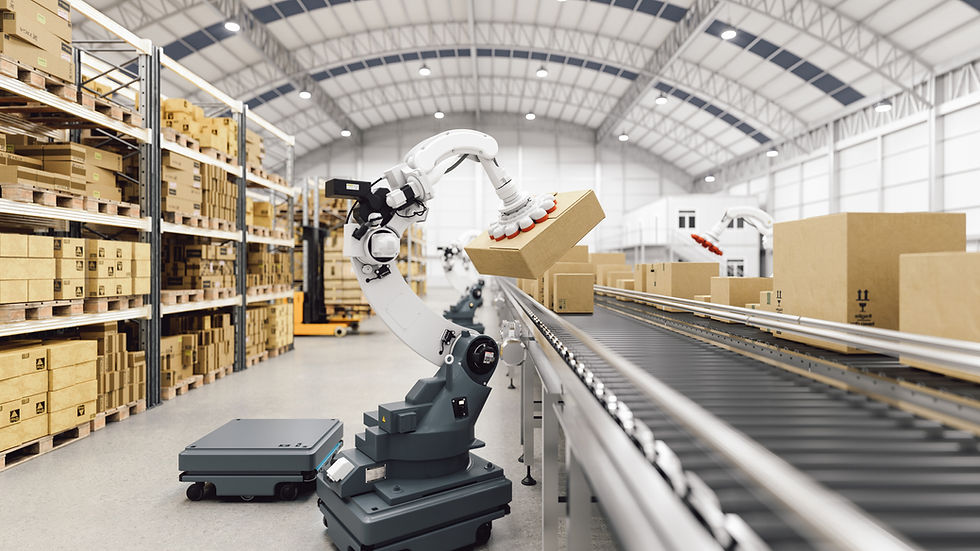AI Revolutionizes Supply Chain Management
- Bradley Rogers
- Dec 23, 2024
- 3 min read
Artificial Intelligence (AI) is transforming supply chain management, enhancing resilience and performance while navigating ever changing market conditions. A recent study by Wamba, Queiroz, and Trinchera (2021) provides compelling evidence of AI's impact on supply chains.
AI's Impact on Supply Chain Resilience and Performance
The research investigated two critical questions:
1. How does AI-driven innovation affect supply chain resilience and performance?
2. What role does supply chain dynamism play in moderating these relationships?
The findings reveal that AI-driven innovation significantly enhances both supply chain resilience and performance. This improvement is particularly pronounced in highly dynamic supply chain environments, where AI's capabilities shine.
Quantitative Insights
The study's robust methodology involved:
- Survey data from 281 supply chain professionals across various industries
- Partial least squares structural equation modeling (PLS-SEM) for data analysis
This approach allowed researchers to quantify AI's effects on supply chain outcomes, providing concrete evidence of its benefits.
AI as a Competitive Advantage
AI-powered supply chains offer several competitive advantages:
- Rapid Response: AI enables quick adaptation to market changes
- Operational Efficiency: AI-driven processes are difficult for competitors to replicate
- Unique Value Propositions: AI facilitates the creation of differentiated offerings
These advantages align with Porter's concept of differentiation strategy, positioning AI as a key driver of competitive edge in supply chain management.
Practical Implications
This research highlights the significance of investing in AI-driven innovation for supply chain professionals and business leaders. By utilizing AI, companies are able to:
- Boost supply chain resilience
- Improve overall performance
- Better navigate dynamic market conditions
AI Applications in Supply Chain Management
AI's potential in supply chain management extends to various areas:
Demand Forecasting: AI algorithms can analyze historical data, market trends, and external factors to predict demand with higher accuracy. This leads to optimized inventory levels and reduced costs.
Inventory Management: AI-powered systems can automatically adjust stock levels based on real-time data, minimizing overstock and stockouts.
Route Optimization: AI can calculate the most efficient delivery routes, considering factors like traffic, weather, and delivery windows, leading to reduced transportation costs and improved delivery times.
Supplier Selection: AI can analyze supplier performance data, market conditions, and risk factors to recommend the most suitable suppliers for specific needs.
Quality Control: Machine learning algorithms can detect defects in products more accurately and consistently than human inspectors, improving overall quality and reducing waste.
Challenges and Considerations
While AI offers significant benefits, implementing it in supply chains comes with challenges:
Data Quality: AI systems rely on high-quality, consistent data. Ensuring data accuracy and integrating data from various sources can be complex.
Skill Gap: There's a need for professionals who understand both supply chain operations and AI technologies. Companies may need to invest in training or hiring specialized talent.
Initial Investment: Implementing AI solutions often requires substantial upfront investment in technology and infrastructure.
Ethical Considerations: As AI becomes more prevalent in decision-making, companies must address ethical concerns, such as bias in algorithms and data privacy.
Future Outlook
As AI continues to evolve, its role in shaping efficient, responsive, and competitive supply chains will only grow in importance. The integration of AI with other technologies like Internet of Things (IoT) and blockchain promises even greater potential for supply chain optimization.
Companies that successfully leverage AI in their supply chains are likely to gain a significant competitive advantage in the coming years. However, this will require ongoing investment, adaptation, and a commitment to innovation in an increasingly dynamic business environment.



Comments